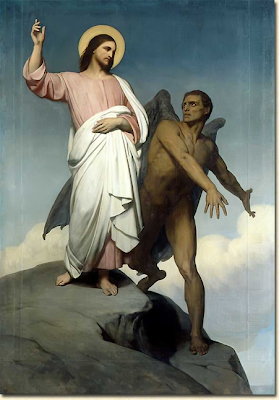Sin as a Conflict of Interest

It has always fascinated me how people can be somewhat disgruntled about how often the Catholic Church mentions or discusses sin. Contrary to this view, I actually appreciate the richness of the thematic arrangement of Scripture and the prayer during Lent which are much more focused on the state of man and what God is doing/has done for man in response. I appreciate this because I know sin is the only thing that is capable of keeping us from God. It is the enemy par excellence, one which we most often defend because we believe it to be part of the good of our being that we had no choice in choosing (but this is clearly false thinking). A better comparison is toward to the point of Lent is, sin is a disease, which healing is required to purge. This is exactly the point of this post namely that we choose it because of the perceived immediate good that it is in a or any given circumstance, and at the same time, we know that it is not the Good, which provides all goods and is our ultimate goal.
We may experience a diminished freedom when it comes to sin, yet we can often trace our current limitations to a moment in the past when we had greater freedom and made a wrong choice. Even though our freedom may now be lessened, we are still generally able to resist temptation. More importantly, we have the capacity to develop the virtues that draw us away from the edge of sin, a place we often find ourselves dangerously fascinated with. If we fully understood the consequences of sin in all their worst aspects, we would clearly recognize it as the wrong choice. Our first parents, Adam and Eve, had this clarity when God warned them, "You may freely eat of every tree of the garden; but of the tree of the knowledge of good and evil you shall not eat, for in the day that you eat of it you shall die" (Genesis 2:16-17).[1] Still, they turned their attention away from what was freely given and fixated on the forbidden, revealing an early tendency to place our desire in material things. Often, we see a perceived good that seems more appealing than the true good itself, creating an inner conflict: do I choose what appears better or what I know to be right? If we were honest with ourselves, we would realize that nothing outside of what God has given us is truly desirable. He has already provided everything good that we need, although some gifts require the right time and context to be fully received. This understanding should lead us to choose what is genuinely good rather than chasing after illusions of something greater.
In conclusion, this would not get so much airtime if it was not the preeminent issue that befalls man. It is time we were honest with ourselves about what the real weight and spectrum of goods is. Let us understand, then that we ought to put ourselves in a situation where our perceived good and actual good may become incompatible. Our paradigm is "What must I do to attain the highest possible good in the context to win Goodness Himself?" rather than "How close can I get to the edge and avoid evil?". Sin is a conflict of interest within us, between the long and the short-term goods (usually), but there is no conflict of interest between us and God, who is the fullness of our good. Let us then focus on the important details.
O Egypt, how sweet and succulent your memory,
how ghastly your reality.
How bent toward you are we?
How fast our relationship with God loses its gravity.
Whilst you O God bestow on us grace upon grace,
we cannot seem to lift our faces.
The hungry batten on excess,
and the gluttons for all there wealth regress.
In your providence, O Lord, those who cling to this world lose sight of your face.
They accuse you of betrayal, falling short of grace.
If only they knew You, if only the were to rend their hearts,
at once they would be satisfied, for the horn of your anointed shall be exalted in all its parts.
FN:
- Genesis 2:16b-17


